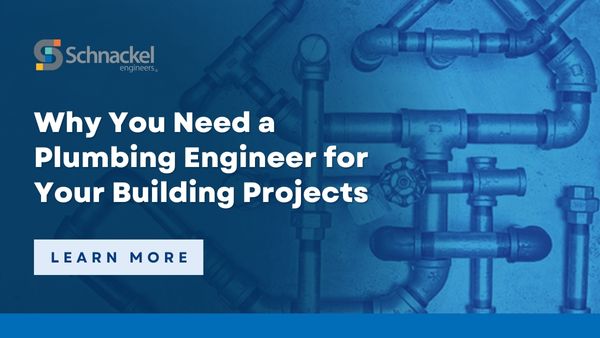Why You Need a Plumbing Engineer for Your Building Projects

If you are planning a building project, whether it be new construction or a renovation, it is important to consider hiring a plumbing engineer. While a general contractor may be able to handle many aspects of your project, a plumbing engineer brings specialized knowledge and expertise that is essential for the proper design, installation, and maintenance of your plumbing system.
What is a Plumbing Engineer?
Plumbing engineers are professionals who specialize in the design of plumbing systems for buildings. They have the knowledge and expertise to ensure that your plumbing system is not only functional, but also meets all necessary codes and regulations. Plumbing engineers play a crucial role in the construction and maintenance of buildings and are an important part of any building project.
What does a Plumbing Engineer do?
Plumbing engineers collaborate with architects and other construction professionals to design and specify the plumbing systems for a new building or renovation project. This consists of determining the size and layout of pipes, water heaters, and other plumbing components. They can also be responsible for overseeing the installation of plumbing systems in a construction project. This includes coordinating with contractors and ensuring that all work is completed according to code and on schedule. They are capable of working on a wide variety of projects, including those involving industrial, commercial, and government buildings.
Here are a few reasons why hiring a plumbing engineer is essential for your building project:
Design Expertise
A plumbing engineer leverages their design expertise to create plumbing systems that are functional, efficient, cost-effective, and code compliant. They consider factors such as water pressure, temperature, and flow rates to ensure that the plumbing system meets the needs of the building and its occupants. They can help you determine the best layout for your plumbing system and choose the most appropriate materials and fixtures to meet your needs. By staying current with advancements in the field, plumbing engineers can design systems that are durable, energy-efficient, and sustainable. Additionally, the plumbing engineer can work with architects and other construction professionals to integrate the plumbing system with the overall design of the building, creating a cohesive and functional final product. By utilizing their design expertise, the plumbing engineer ensures that the plumbing system is tailored to the specific needs and goals of the project, providing long-term value and satisfaction.
Project Coordination
The plumbing engineer can effectively coordinate with other design and construction professionals, ensuring that the plumbing system is integrated with the overall building design and construction schedule. They collaborate with architects, structural engineers, mechanical engineers, and other relevant stakeholders to develop a plumbing system that meets the building’s specific requirements.
Efficiency
A plumbing engineer can help increase efficiency in a building by designing and specifying plumbing systems that are optimized for energy efficiency. This may involve using low-flow fixtures, efficient water heaters, and properly sized pipes to minimize waste and reduce energy consumption. The engineer can also incorporate smart technologies, such as water-saving sensors, to further enhance efficiency. By working closely with architects and other construction professionals, the plumbing engineer can ensure that the building’s plumbing system is designed and installed with efficiency in mind, helping to lower costs and reduce the environmental impact of the building over time.
A plumbing engineer can help you save money on your building project by identifying ways to reduce water usage and minimize waste. They can also help you find cost-effective solutions for any plumbing challenges that may arise during the construction process.
Quality Assurance
Plumbing engineers perform field inspections, oversee installation, and review shop drawings to ensure that the plumbing systems are installed correctly and functioning as intended.
Safety
A plumbing engineer plays an important role in ensuring the safety of a building’s plumbing system. They design and specify plumbing systems that comply with safety codes and regulations, such as those related to water pressure, temperature, and sanitation. The engineer can also incorporate safety features, such as backflow prevention devices and automatic shut-off valves, to reduce the risk of water damage or contamination. By taking a comprehensive approach to safety, the plumbing engineer helps to ensure that the building’s plumbing system is safe and reliable for its occupants.
Compliance with Codes and Regulations
Plumbing engineers are knowledgeable about local, state, and national building codes and regulations related to plumbing. They will ensure that your plumbing system meets all necessary standards and requirements, which can save you time and money in the long run.
Energy Efficiency and Sustainability
With an increasing focus on sustainability and energy efficiency, plumbing engineers design plumbing systems that meet these requirements, reducing the building’s overall impact on the environment and reducing energy costs.
Problem-Solving Skills
Plumbing engineers are skilled at problem-solving and can help you troubleshoot any issues that may arise with your plumbing system. They can also help you develop a maintenance plan to ensure that your plumbing system stays in good working order for years to come.
Long-term value
By hiring a plumbing engineer, you can be confident that your plumbing system will be designed and installed to last. This can help save you money in the long run by reducing the need for costly repairs or replacements.
Furthermore, plumbing engineers play an important role in addressing global challenges, such as groundwater contamination and depletion, ensuring access to safe drinking water and sanitation, and reducing the spread of waterborne diseases. To address these issues, they apply their knowledge of water reuse systems, treatment techniques, backflow prevention, piping materials, and leading-edge technologies.
Conclusion
Investing in a plumbing engineer for your building project is a wise decision. With their expertise, they can guarantee that your plumbing system is efficient, compliant with regulations, and cost-effective. Additionally, their problem-solving skills can prove valuable in ensuring your project’s success. If you want to learn more about the plumbing design services provided by Schnackel Engineers and how we can assist you, don’t hesitate to contact us today.
Comments